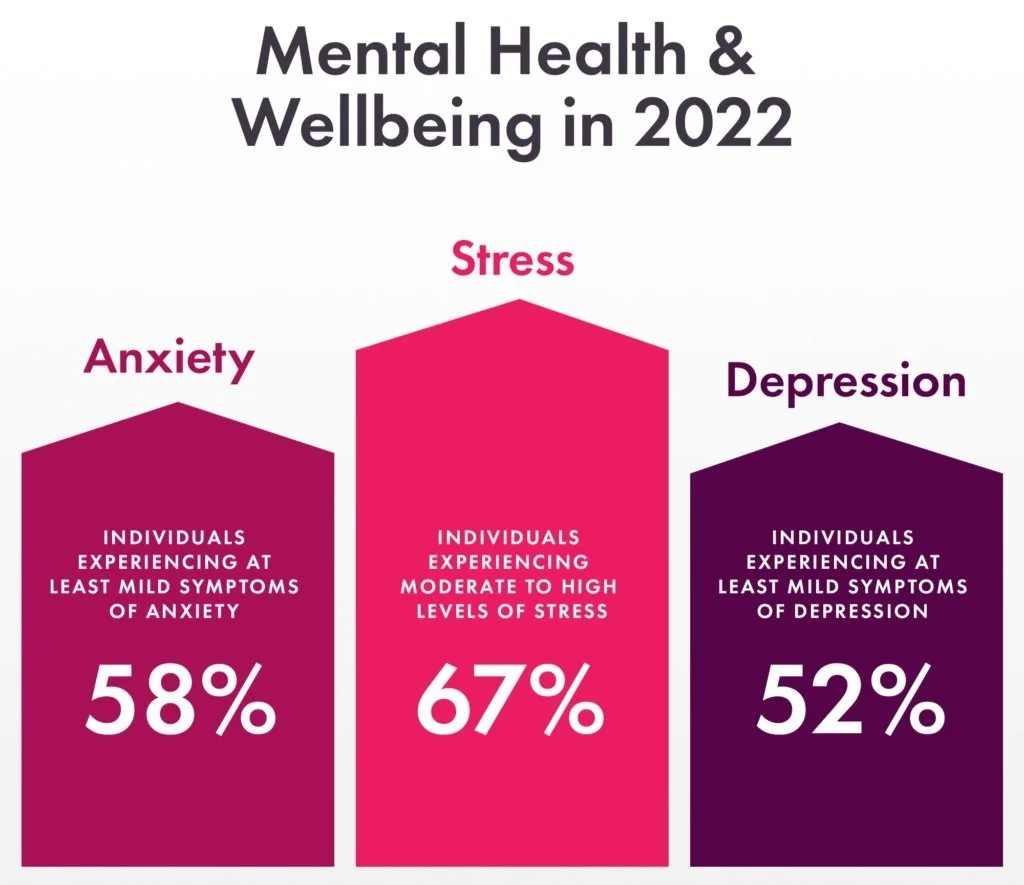
1 in 6.8 people in the UK have experienced mental health issues in the workplace
Corporate Mental Fitness and Wellbeing Service Fareham, Portsmouth, Southampton & Winchester
According to HSE recommendations, businesses are required to have one qualified first aider for every 50 staff. We have strict rules around protecting the physical health of our staff, but what about their mental health?
1 in 6.8 people in the UK have experienced mental health issues in the workplace
More than 1 in 5 people (21%) have called in sick due to stress
14% of people listed the reason for their resignation as workplace stress, with a further 42% of people considering resigning due to stress
30% of staff strongly disagreed with the statement: ‘I would feel able to talk openly with my line manager if I was feeling stressed’
Investing in Mental Health
The data above tells us a lot about the poor state of the UK working population’s mental health. Business owners value their staff and want to make sure they are being supported, but also need to justify any costs associated with this support to investors and board members. What is the bottom line when it comes to mental health? According to Sainsbury’s Centre for Mental Health, UK businesses spend:
£8.4 billion a year in absence because of sickness. The average employee takes 7 days off sick each year, of which 40% are for mental health problems. This adds up to 70 million lost working days a year, including 1 in 7 directly caused by a person’s working conditions
£15.1 billion a year in reduced productivity at work. ‘Presentee-ism’ accounts for 1.5x as much working time lost as absenteeism and costs more to employers because it is more common among higher-paid staff
£2.4 billion a year in replacing staff who leave their jobs because of mental ill-health +
Which businesses do this well?
Larger companies and those that have a largely millennial staff are paving the way for the rest of us in regard to mental health initiatives. Millennials are typically harder to retain because they have high expectations when it comes to company culture and benefits. Smaller businesses often have a closer working relationship with employees and this means they are quickly following suit.
Apple
Steve Jobs shared his meditation practice with Apple and was considered a pioneer of “mind technology”. He gave employees access to a meditation room, 30-minute daily meditation breaks and on-site yoga and meditation classes. These were all part of a process that Steve used to reduce his own stress, gain more clarity and enhance his creativity.
“Search inside yourself” was an initiative created by one of Google’s original software developers in 2007. Following on from this, Google offers an on-site meditation space, and courses on meditation and well-being. Google execs have the strong belief and revenue to prove that meditation can help improve, not only employee mental health and well-being, but the company’s bottom line as well.
P&G
CEO A.G. Lafley was one of the first to offer a meditation instruction program and install meditation spaces in offices. He’s quoted to say, “You cannot out-work a problem, you have to out-meditation it.”
Innocent Drinks
The quirky drinks company stands for health and happiness and it extends this to its customers and employees alike. As well as flexible hours, free lunch and gym membership, Innocent provides a free yoga club and access to a confidential employee assistance programme to offer staff a safe place to talk 24/7.
Sweaty Betty
The popular women’s activewear brand launched the “reclaim your lunch break” initiative where employees are actively encouraged to take part in lunchtime yoga classes and running clubs arranged by the business. They also provide all employees with free counselling and support as well as access to education modules on the key causes of stress such as financial well-being.
We’re here to support you
A positive and happy culture can do wonders for your business’s reputation, staff attraction and retention as well as customer perception of your business. Happy staff means happy customers and there are a lot of initiatives we can support you to introduce to ensure your employees are looked after mentally.
We will tailor our approach to your business and make sure you see effective and measurable change. We can support you in offering 1-1 sessions, workshops, classes and consultancy as well as online support. Workshops are tailored to combat any pre-existing negative attitudes towards mental health and make a positive impact on the culture of the business overall.
Classes may include meditation and mindfulness to teach staff how to destress, centre themselves and ultimately be more productive. Benefits of meditation and mindfulness include:
A reduction in the stress hormone cortisol. This is the cause of weight issues, fatigue, skin problems, irritability and difficulty concentrating
Improved productivity, innovation and creativity
Improved communication and less confrontation
Reduction in stress and burnout
Heightened attention span
Improved memory and cognitive function
To find out more about how we can help your business, call the Hampshire Hypnotherapy & Counselling Centre today and we’ll create a customised strategy for you and your employees.
*Source - Mental Health foundation
**Source - Mind.org
+Source - Sainsbury Centre for Mental Health. (2009). Briefing 40: Removing Barriers. The facts about mental health and employment. Retrieved from ohrn.nhs.uk/resource/policy/TheFactsaboutMentalHealth.pdf



